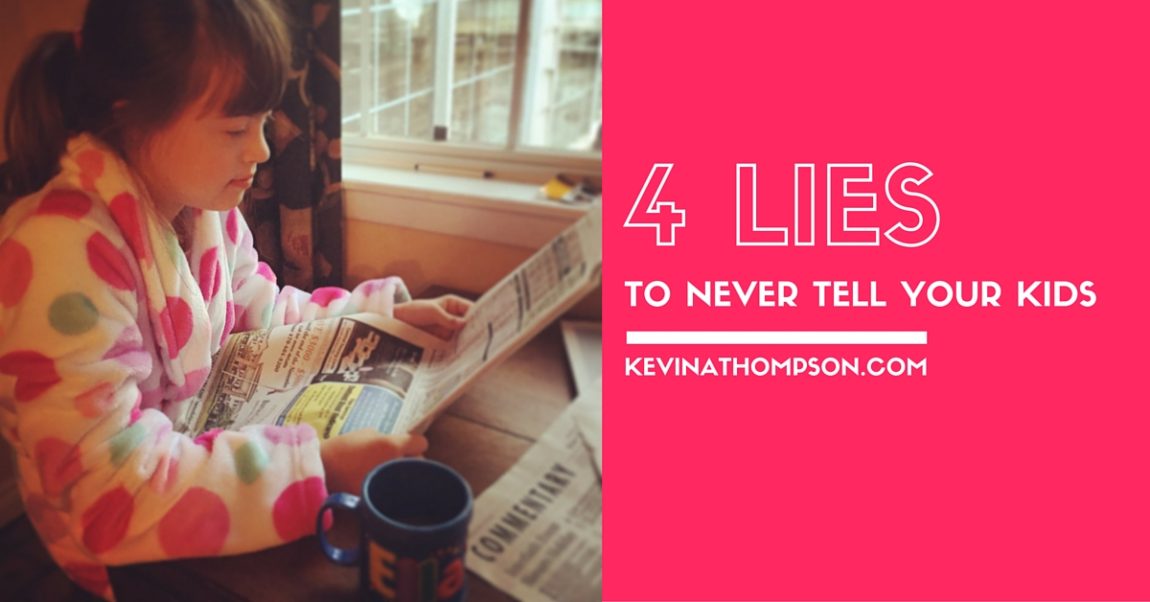Parents lie to children. Most lies aren’t told with malicious intent. Most of them are told for convenience. It’s often easier in the moment to tell a child some white lie which will appease them rather than telling an aspect of the truth which might lead to more questions.
“Where do babies come from?” Johnny asks.
Johnny’s mom could take the time to consider Johnny’s age, narrow down the most relevant facts, and tell Johnny the truth–babies grow in mommy’s belly until they are born. The problem with this answer is the obvious follow-up–“How does the baby get in mommy’s belly?” (See: No Lies/No Slang–How to Raise Healthy Kids that Make Grandparents Uncomfortable)
Not wanting to answer the potential follow-up questions, Johnny’s mom simply says, “You get one at the hospital.” This answer might appease a three-year-old, but it’s a lie. While lies can make our lives easier in the moment, they always make them more complicated in the long run.
A Good Family Rule
Every family needs to apply the following family rule: we always tell the truth. We might not tell every detail. We don’t over share. We always tell the truth in the context of individual maturity. But we do not lie to one another.
By consistently telling the truth, we train our children that we are reliable sources of information. They grow to learn they can always come to us for the facts.
Unfortunately, many parents continue to lie. They do so without understanding the long-term toll it takes on their parenting. As children begin to understand their parents are not telling them the truth, the kids turn to other sources for information. The parents might not even realize this is happening or might think it’s a natural part of family dynamics. As one generation lies to another that generation will likely lie to the next. Some families have no understanding of what it would look like to tell the truth within their family.
But the truth is always better.
4 Lies to Never Tell Your Kids
1. It won’t hurt. It’s okay to say this if you are absolutely certain it won’t. However, if it might hurt, it is far better to let your child know. If a baseball hits you, it will hurt. A shot will hurt. Doing hard things can hurt. Our children do not need physical pain minimized, they need to learn how to endure some pain in order to get the outcome they want. Rather than denying the possibility of pain, parents should explain the likely possibilities.
2. You have nothing to worry about. Do you ever remember a time of no worries? Life is full of stress. It’s true for four-year-olds just as much as forty-year-olds. While the stress of a child might seem like nothing to an adult, it feels like a lot to a child. In the same way we shouldn’t minimize our child’s physical pain, we shouldn’t minimize their emotional pain either. Rather than telling our children they have nothing to worry about, we need to explore with them what their concerns are.
3. Your dog went to live with his friends. No he didn’t. He died. The dog died. And your kids need to know it. While a parent kindly desires to protect their children from the dark realities of death, they can’t be sheltered from the sorrows of life. It’s far better to learn about life and death via a dog or goldfish as a small child rather than having your first experience with death be with a close loved one. (For a serious article see: Walking My Son through the Death of His Grandfather, or for a laugh see: Thanksgiving Killed My Dog)
4. If you don’t obey, we are canceling vacation. Will you really “turn this car around?” Are you actually willing to cancel the Disney vacation? If so, then make all the threats you want. If not, then stop lying to your kids. Parents love to threaten. It’s a way to manipulate our child to get our way. Yet whenever we threaten something we aren’t willing to do, our kids will eventually understand the game. Then they will know our words are empty. Laying out clear consequences for the bad choices our children make is great parenting. We should do so often. Over-exaggerating consequences which we aren’t willing to follow through on is horrible parenting which we must stop.
In some instances, telling the truth is hard work. It takes discernment, time, and will likely lead to more conversations. However, teaching our kids to value the truth and modeling for them that we are always a source of truth is well worth the effort.
Stop lying to your kids and watch how your relationship with them changes.
What is a 5th lie we should never tell our kids?




6 Responses to 4 Lies to Never Tell Your Kids